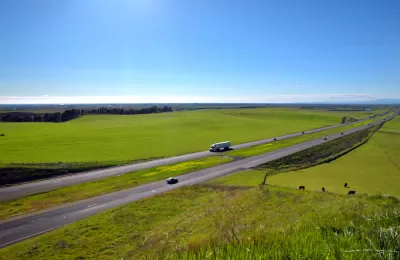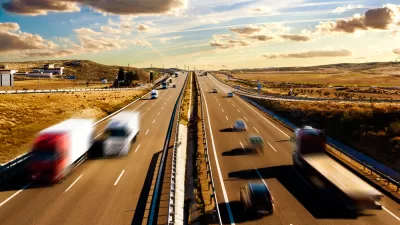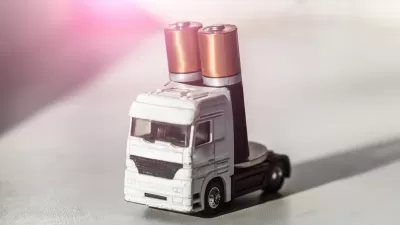The bill is directed at the medium and heavy-duty trucking industry, which, along with buses, account for 90 percent of the state's toxic diesel exhaust. Diesel emissions would need to be reduced by 80 percent by 2050. Will electric trucks be ready?

On March 7, State Sen. Nancy Skinner, D-Berkeley, introduced Senate Bill 44, dubbed “Ditching Dirty Diesel,” which is "designed to phase out, over time, the use of polluting, diesel-fueled medium- and heavy-duty trucks and buses in California and to speed up the transition to cleaner vehicle technologies and fuels, including zero emission vehicles (ZEVs)," according to her office.
“It’s no secret that medium- and heavy-duty trucks and buses are significant sources of lung-damaging particulate matter,” Skinner said. “But what is less known is that diesel-fueled trucks and buses produce nearly one-quarter of GHG emissions from California’s transportation sector.”
Since 1998, the California Air Resources Board has recognized diesel particulate matter as a toxic air contaminant based on the relationship between diesel exhaust and lung cancer.
SB 44 "would direct the California Air Resources Board to require a 40 percent reduction in diesel emissions by 2030 and an 80 percent reduction by 2050, cuts that experts say would not be possible without a major overhaul of the trucking industry," writes Peter Fimrite, science reporter for the San Francisco Chronicle.
According to one source of this correspondent, that could be one of the main intentions of the bill: to tap into the Low Carbon Transportation Investments and Air Quality Improvement Program to provide more funds for heavy-duty truck electrification projects. An SB 44 fact sheet [pdf] indicates that the bill calls for the appropriation of "funds through 2025 to support the purchase of clean medium and heavy-duty vehicles by businesses across California."
In regards to truck electrification, readers may wish to listen to KPBS Midday Edition (NPR Affiliate in San Diego), "How Soon Will Big Rigs Go Electric In California?" with environment reporter Joshua Emerson Smith of The San Diego Union-Tribune on Feb. 19.
Heavy-duty diesel trucks emit 70 percent of the most toxic air pollution from on-road vehicles in California. And a lot of that pollution is centered in lower-income neighborhoods. So there's an effort underway in San Diego and at loading docks across the state to switch to cleaner equipment.
"Diesel engines are more than 97 percent cleaner today than they were in 1990," Smith states in responce to one of host Maureen Cavanaugh's questions.
"Now the race is on to roll out the first battery-powered big rigs — a move aimed at not only curbing greenhouse gases but harmful air pollution that overwhelmingly impacts low-income neighborhoods from Oakland to Long Beach to Barrio Logan, reports Smith in his Feb. 18 article, "How fast can California switch from diesel-burning freight trucks to electric big rigs?" in the article that prompted the interview.
"Skinner’s bill follows a ruling in December by the California Air Resources Board requiring all transit agencies to make their fleets entirely emission-free within two decades," adds Fimrite of the Chronicle. "The rules prohibit the purchase of any new gas- or diesel-powered public transit buses by 2029 and require all buses to be emission-free by 2040."
In a related opinion published Feb. 4 in the Chronicle, Rocky Rushing, a senior policy advocate for the Coalition for Clean Air, writes in support of new legislation to establish a smog certification program for heavy-duty diesel trucks.
State Sen. Connie Leyva, D-Chino (San Bernardino County), introduced SB 210, which would require owners of heavy-duty diesel trucks to certify they meet the state’s emission standards.
-
California Orders All-Electric Buses by 2040, December 18, 2018
- See several recent posts tagged "Electric Trucks."
Hat tip to Earthjustice's Right To Zero March 15 newsletter.
FULL STORY: Diesel trucks would be nearly eliminated in California under proposed law

Planetizen Federal Action Tracker
A weekly monitor of how Trump’s orders and actions are impacting planners and planning in America.

Congressman Proposes Bill to Rename DC Metro “Trump Train”
The Make Autorail Great Again Act would withhold federal funding to the system until the Washington Metropolitan Area Transit Authority (WMATA), rebrands as the Washington Metropolitan Authority for Greater Access (WMAGA).

DARTSpace Platform Streamlines Dallas TOD Application Process
The Dallas transit agency hopes a shorter permitting timeline will boost transit-oriented development around rail stations.

Supreme Court Ruling in Pipeline Case Guts Federal Environmental Law
The decision limits the scope of a federal law that mandates extensive environmental impact reviews of energy, infrastructure, and transportation projects.

Texas State Bills to Defund Dallas Transit Die
DART would have seen a 30% service cut, $230M annual losses had the bills survived.

Bikeshare for the Win: Team Pedals to London Cricket Match, Beats Rivals Stuck in Traffic
While their opponents sat in gridlock, England's national cricket team hopped Lime bikes, riding to a 3-0 victory.
Urban Design for Planners 1: Software Tools
This six-course series explores essential urban design concepts using open source software and equips planners with the tools they need to participate fully in the urban design process.
Planning for Universal Design
Learn the tools for implementing Universal Design in planning regulations.
Roanoke Valley-Alleghany Regional Commission
City of Mt Shasta
City of Camden Redevelopment Agency
City of Astoria
Transportation Research & Education Center (TREC) at Portland State University
US High Speed Rail Association
City of Camden Redevelopment Agency
Municipality of Princeton (NJ)





























